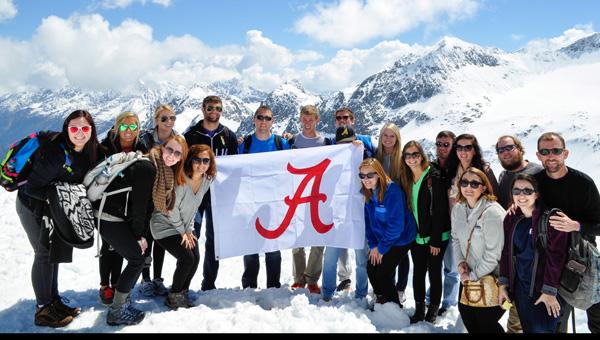Instead of packing bags and heading home this past summer, over 700 students from 90 different majors at The University of Alabama collected their most valuable belongings, passports and visas and embarked on study abroad trips across six different continents.
According to data provided by Carolina Robinson, director of Capstone International Programs, the most popular study abroad destinations of summer 2014 were in Europe. During the interim and summer courses, students most often studied abroad in Spain, followed closely by Italy, England, France and Austria.
Over the 2013-14 school year, almost 60 percent of students studied in a a faculty-led program, as opposed to an exchange or an affiliate program.
“We had about 35 programs this summer where a [University] faculty member was taking the student abroad,” Robinson said.
Glenn Tootle, an associate professor, just completed his third summer as the faculty supervisor of the Innsbruck, Austria, study abroad program, in which students of any major can attend the interim and complete the natural science course, Water Resources and Climate in the European Alps. Students may also stay through Summer I and study Glaciology, a second course in natural science.
Tootle said he focuses on scheduling equal numbers of lectures and field trips throughout the course to provide a more hands-on learning experience.
“The last thing I want to do is a teach a course in Innsbruck, Austria, that I can teach in Tuscaloosa, Alabama,” he said. “The purpose of this course is for you to see the sights and meet the people, because I think that’s what an abroad course should be about.”
The differences in climate and culture create the opportunity for a distinct learning experience, but Tootle also said he enjoys taking the trip to Austria – the fifth most popular destination for studying abroad in the summer – because Innsbruck is a safe and affordable city to visit.
“I call Innsbruck the ‘Tuscaloosa of the Alps,’” Tootle said.
To enroll in Tootle’s course, students pay one course fee that includes room and board, tuition and other related expenses, as is true for other summer faculty-led programs. This policy makes traveling abroad fairly affordable and helped Talia Ulrich, a sophomore majoring in international studies, make the decision to attend the University.
“I wanted to make sure that I could study pretty much anywhere that I wanted to, and that if [the college] didn’t offer the program, they knew of some way for me to still study abroad,” Ohio-native Ulrich said.
Ulrich found the University’s program met her criteria, and she just returned from a faculty-led summer trip to Tanzania.
Ninety percent of the students studying abroad in the 2013-14 academic year did so for credit programs, while the other 10 percent engaged in internships and service learning. Capstone International’s website includes a search engine that compiles a list of available programs and can be tailored to a student’s major, country and semester of interest.
Since returning in late June, Ulrich has met with Robinson and applied to study abroad in Spain next semester to enhance her knowledge of Spanish and Arabic languages and cultures.
“The experiences that I got, you wouldn’t learn them on campus,” Ulrich said of her summer experience in Tanzania.
For Robinson, studying abroad is about providing students with the opportunity to enhance their learning. She is originally from Colombia and travelled to South America while on the country’s national swim team.
Robinson has been the director at the University since June, and she previously worked at the University of Georgia in coordinating study abroad trips in the agricultural and environmental sciences department.
“My goal for students, the only thing, really, is for them to learn how to be comfortable in an uncomfortable situation,” she said.
Maggie Trabucco, a junior majoring in public relations and theatre, traveled with five other students on a faculty-led program to Greece, and though they didn’t know one another before the trip began, Trabucco said they bonded over their desire to travel.
“I think it’s really important to go and be uncomfortable. And I was finding myself really, really comfortable here,” Trabucco said.
She found the theatre, architecture and history of the Greek culture fascinating, which made her more culturally aware of the world around her.
Although Trabucco decided to take the trip well over six months in advance, Brock Mayhak, a sophomore majoring in aerospace engineering, decided fairly late in the semester that he wanted to study abroad.
Robinson recommends beginning the process a year in advance to ensure all necessary paperwork is completed and to give students more time to meet scholarship deadlines.
Mayhak said completing the necessary applications was fairly easy, he decided to study abroad to get overseas and travel experience before applying for jobs after college.
“I’ve met so many people from so many different schools that I’ll hopefully keep in touch with over the years. I think [studying abroad] definitely opens up connections for the future,” he said.
Robinson said she agreed that studying abroad gives students an experience that goes far beyond just obtaining course credit.
“Studying abroad is a way to differentiate yourself, because you do learn those cultural competencies, you do learn all those soft skills that only an experience can teach you,” she said.
Chemical and biological engineering majors sent the most students abroad the past academic year, followed by biology and the public relations. To greater assist students in selecting a program, Capstone International has assigned advisors to specific colleges: one in arts and sciences, one for business and one for other majors. Students are still encouraged to visit the Capstone International Center in B.B. Comer with any inquiries.
A study abroad fair will take place outside the B.B. Comer building Sept. 16.









